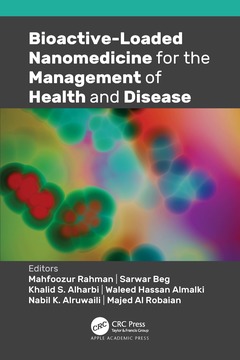Bioactive-Loaded Nanomedicine for the Management of Health and Disease
Coordonnateurs : Rahman Mahfoozur, Beg Sarwar, Alharbi Khalid S., Almalki Waleed Hassan, Alruwaili Nabil K., Robaian Majed Al

The new book focuses on the use of natural active substances and nutraceuticals in nano-research for improved healthcare management and applications. It explores advanced nanomaterials that can be utilized for the encapsulation of nutrients, vitamins, and phytoconstituents for the treatment of cancer, psychotic and manic disorders, and chronic inflammation, such as arthritis and psoriasis, as well as for other healthcare issues, such as skin diseases and skin care, atherosclerosis, and more. The chapters discuss the remarkable advantages of using new bioactive and nutraceutical drugs, which offer improved solubility, bioavailability, simultaneous drug delivery, safety extension, long-term delivery, better dissemination of tissue macrophages, security against toxicity, increase in pharmacological activity, and enhanced physical and chemical protection.
PART 1: Bioactive-Loaded Nanomedicine as Anticancer Potential 1. Phyto-Actives and Their Targeted Action in Management of Hepatocellular Carcinoma: Scope of Nanomedicine in Its Effective Delivery 2. Thymoquinone-Loaded Nanomedicines for Triple-Negative Breast Cancer Treatment 3. Nucleic Acid-Loaded Nanomedicines with Enhanced Anticancer Potential 4. Breast Cancer Therapy by Combinatorial Herbo-Synthetic Nanocarrier PART 2: Phytoactives-Loaded Nanocarriers as Antipsychotic and Antimanic Potential 5. Antipsychotics and Antimanics: An Insight into Mechanism of Action of Natural Compounds 6. Plant-Derived Anti-Psychotic Drugs: An Insight into Receptor and Phytoconstituent Interaction 7. Plant Bioactive Compounds and Its Nanoformulations for the Treatment of Alzheimer’s Disease PART 3: Phytoactives-Encapsulated Nanocarriers as Anti-Inflammatory Potential 8. Bioactives-Loaded Nanomedicines for Arthritis Treatment 9. Curcumin-Loaded Nanocarriers for Anti-Inflammatory Applications 10. Management of Psoriasis: Delivery Approaches for Synthetic and Herbal Drugs PART 4: Bioactive-Encapsulated Nanocarrier in Other Healthcare Applications 11. Phytochemical-Based Nanocosmoceuticals for Beauty and Skin Therapy 12. Vitamin-Loaded Nanocarriers as Nutraceuticals in Healthcare Applications 13. Key Roles of Nutrients in Healthcare and Their Drug Delivery Approach 14. Nanotechnology-Based Drug Delivery System Used for Loading of Umbelliferone: A Review 15. Emergence of Nanophytomedicine in Healthcare Setting 16. Therapeutic Benefit of Polygala senega and Senegin in Medicine: A Concise Report of Their Therapeutic Potential 17. The Health Benefit of Gossypetin (A Flavonoid, Against Inflammation and Atherosclerosis): A Systematic Review of Pharmacology and Bioanalytical Tools
Mahfoozur Rahman, PhD, is Assistant Professor at the Department of Pharmaceutical Sciences at Sam Higginbottom University of Agriculture, Technology & Sciences, India. His research focuses on development and characterization of nanosized drug delivery systems for inflammatory disorders. To date, he has published over 100 publications in peer-reviewed journals as well as book chapters, books, and articles in international magazines. He is also a guest editor for several journals.
Sarwar Beg, PhD, is Assistant Professor at the School of Pharmaceutical Education and Research, Jamia Hamdard (Hamdard University), New Delhi, India. He has nearly a decade of experience in systematic development and characterization of novel and nanostructured drug delivery systems using QbD paradigms, including design of experiments (DoE) and quality risk management (QRM). He has published review/research journal articles, book chapters, books, and journal special issues.
Khalid S. Alharbi, PhD, is Assistant Professor in the Department of Pharmacology, College of Pharmacy, Jouf University, Sakakah, Saudi Arabia. His major area of research is cancer, focusing on drug discovery, nanomedicine, and preclinical pharmacological and toxicological studies of anticancer agents. He has published several articles in peer-reviewed journals and has presented papers at numerous international conferences.
Waleed Hassan Almalki, PhD, is Professor of Pharmacology at the College of Pharmacy, Umm Al-Qura University, Makkah, Saudi Arabia. His research is focused on host-virus networks in Hepacivirus C disease progression and host-virus genes expression during oxidative stress, hepatic steatosis, fibrosis, and hepatocellular carcinoma. He has published on HCV pathogenesis and treatment and drug designing, as well as angiogenesis, pharmacological assays, and infectious disease epidemiology.
Nabil K. Alruw
Date de parution : 12-2022
15.6x23.4 cm
Thèmes de Bioactive-Loaded Nanomedicine for the Management of... :
Mots-clés :
Triple Negative Breast Cancer; Nanotechnology Based Drug Delivery System; SLNs; NLCs; Delivery Systems; GA; Withania Somnifera; Polygala Senega; Triple Negative Breast Cancer Treatment; HCC; Mesocortical Pathway; Bioactive Compound; Terpene Lactone; PCL; Glycyrrhiza Glabra; Glycyrrhizic Acid; HCC Therapy; Theranostic Liposomes; FST; ROS; TNBC Cell Line; Antipsychotic; Anti-Psychotic Drugs; Flavonoidal Compounds; OGTT Test
